Table of Contents[Hide][Show]
- Who Wrote Jingle Bells?
- James Lord Pierpont, The Man Who Wrote The Song Jingle Bells, Abandoned His Wife And Children… Multiple Times
- The Jingle Bells Song Was Plagiarized From Other Popular Sleigh Riding Songs
- Jingle Bells Was Originally Written As A Thanksgiving Song, Not A Christmas Song
- Jingle Bells True Meaning: The Song Is Really About Having Sex With Young Girls And Drag Racing Sleighs
- Bing Crosby And The Andrews Sisters Made Jingle Bells The Classic Christmas Song That It Is Today
- Blackface Performers At Minstrel Shows Gave “Jingle Bells” Its First Burst Of Popularity
- James Lord Pierpont Composed A Lot Of Racist Songs For Minstrel Entertainment Groups
- The Man Who Wrote Jingle Bells, Also Wrote Several Confederate Anthems
- The United States Civil War Divides The Pierpont Family
We all know the lyrics for Jingle Bells, at least the chorus anyway, but how much do you know about James Lord Pierpont, the guy who wrote it? Did you know that he mostly plagiarized the popular Christmas carol? Did you also know that he was also a deadbeat dad who made a living by writing racist Minstrel entertainment and anthems for the Confederate Army?
Here’s everything that you need to know about the racist origins of Jingle Bells and James Lord Pierpont, the deadbeat dad who composed the most famous Christmas song of all time.
Just a quick warning here before you continue reading. This article will reveal some very shocking and disturbing facts about the dark origins of Jingle Bells and its composer. If this sounds like it might ruin your Christmas experience, then please go read this article of funny Christmas jokes instead. Because this article is about to take you from White Christmas to Blackface.
WARNING: There’s a dark side to Jingle Bells history. Don’t read this article if you’re a fan of the classic holiday song, ‘Jingle Bells’, because you’ll probably never think about the song the same way again.
Who Wrote Jingle Bells?
The popular holiday song Jingle Bells, was written by a man of questionable character named James Lord Pierpont (1822–1893). Born in Boston, Massachusetts, Pierpont was a wandering soul who tried and failed at a variety of careers and professions during his lifetime. He was a whaler, photographer, tailor, soldier, and even a gold miner. However, Pierpont’s most successful profession was a songwriter of racist minstrel entertainment.
NERD NOTE: Minstrel entertainment was an American form of racist entertainment developed in the early 19th century. The show included sketches, humorous dances, and music, typically featuring white performers wearing blackface, portraying African individuals in a derogatory manner.
Here's the very curious story of a racist named #JamesLordPierpont and how his composition, #JingleBells, became one of the most popular and recognized #ChristmasSongs of all time. Share on XJames Lord Pierpont, The Man Who Wrote The Song Jingle Bells, Abandoned His Wife And Children… Multiple Times
James Lord Pierpont was a wanderer. Nothing tied him down, not even his wife and kids. Throughout his life, he left his school, jobs, and even his family… multiple times.
When he was only 14-years-old, Pierpont ran away from his boarding school to join the crew of a whaling ship in 1836. Several years later, he joined the US Navy and served until 1843.
After he was discharged from the Navy, Pierpont married Millicent “Millie” Cowee on 4 September 1846 and had three children.
But family life was not for him. A few years later in 1849, Pierpont abandoned his wife and children and traveled to California chasing the Gold Rush.
Failing to find fortune in the West, Pierpont became a photographer in San Francisco until his store burned down in 1851. Now completely broke, Pierpont finally returned home to his family in Massachusetts.
But Pierpont didn’t stay in Massachusetts for long. In 1853, just a couple of years after returning home from California, Pierpont left his family, yet again, and traveled to Savannah, Georgia to be the organist at his brother’s church.
In 1856, Pierpont’s wife died. His three young children, all under the age of 10, were now left with a dead mother and an absent father. Did Pierpont leave Savannah and return home to his children? No. Instead he left his kids in Massachusetts to be raised by their grandfather.
Music was his new passion. Over the next several years, Pierpont would shift his focus to music and eventuality publish the now famous Jingle Bells song.
Who wrote #JingleBells? The shocking secret that society has been hiding from us. #JamesLordPierpont #MusicTrivia #ChristmasMusic Share on XThe Jingle Bells Song Was Plagiarized From Other Popular Sleigh Riding Songs
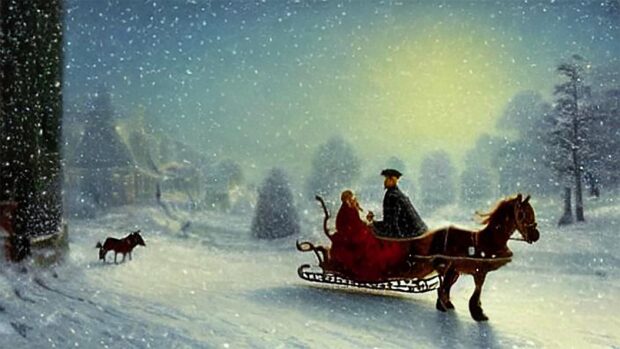
Born in Boston, Massachusetts (April 25, 1822), Pierpont spent his early childhood in the Boston area until going to boarding school in New Hampshire at the age of 10. It’s during this time that he first became interested in sleigh riding. He even wrote a letter to his mother from boarding school about taking a sleigh ride in the New Hampshire snow. That fascination with sleigh riding continued into his adulthood.
In the few years that Pierpont spent with his family in Medford, in between his Gold Rush excursion and his departure to Savannah, GA., he was a regular at Simpson Tavern. It’s during this time that Pierpont probably started piecing together ideas for the song Jingle Bells.
A plaque at 21 High St, Medford, MA 02155, where the tavern used to stand in Medford Square, incorrectly claims that Pierpont composed the Jingle Bells song at Simpson Tavern in 1850. This is impossible because Pierpont was in California at the time.
However, according to local historians, Pierpont was inspired by the sleigh riding songs people would sing while participating in Medford’s popular sleigh races down Salem Street in the mid-1800s.
Years later, in 1857, while living in Savannah, GA, James Lord Pierpont published several musical works, including a song about a sleigh ride with jingle bells. Originally titled “The One Horse Open Sleigh” and later renamed “Jingle Bells”, neither the lyrics or the melody of Pierpont’s song were entirely original. The composition is merely a mishmash of other popular sleigh ride lyrics that Pierpont enjoyed during his youth.
The borrowed concepts, sleigh ride lyrics, patterns and melodies in “Jingle Bells” are striking similar to other popular sleigh riding songs. If Pierpont published his song today, the origins of Jingle Bells would probably be questioned. Copyright lawsuits would also be likely.
Similar songs, like “The Merry Sleigh Ride” and “Buckley’s Sleighing Song“, are both also about guys recklessly dashing through the snow in a sleigh with jingle bells to impress girls.
“The Merry Sleigh Ride”
By Valentine Dister
Merrily dash we o’er valley and hill,
All but the sleigh-bell is sleeping and still,
Bless the dear sleigh-bell!
There’s naught can compare
To its loud merry peal,
As it breaks on the ear.
As swiftly o’er valley and mountains we rove,
The moon riding brightly and calmly above,
Dull sorrow shall hear its in spiriting kneel
In the loud cheerful peal of the merry sleigh bell
CHORUS
Merrily dash we o’er valley and hill,
All but the sleigh bell is sleeping and still
Merrily dash we o’er valley and hill,
All but the sleigh bell is sleeping and still
Bless the dear sleigh bell, there’s naught can compare,
To its loud merry peal, as it breaks on the ear
Where the white plain is smoothest in safety we ride,
Where the deep drift is highest we fearlessly glide, O’er the
Now kiss’d by the moonbeam, outstripping the wind,
The cool sweeping nightgale is parting behind,
Nor steep we asend, and we plunge throu’ the dell,
To the loud lively peal of the merry sleigh bell
leave we it aught our fleet pathway to tell,
But the far distant peal of the merry sleigh bell.
CHORUS
“Buckley’s Sleighing Song”
By Buckley’s Serenaders. Published by Horace Waters.
Come jump into the sleigh, boys;
Come hurry now and start,
The horses mad are prancing,
Impatient to depart.
There’s Kate and Sue, and Nelly too,
Already at the gate,
And pretty girls in plenty now,
The merry sleigh await.
CHORUS
While jingle, jingle, jingle jing,
The bells so merrily ring
Of sleigh bells and of pretty belies,
Oh gaily we will sing.
Away, the wind is sharp and cold,
The snow is falling fast,
Our horses dashing gaily on,
The town will soon be past;
Our clothes are warm, our hearts are light,
We’ve pretty girls beside,
We’ll shout and sing,
There’s no such thing
As danger where we ride.
CHORUS
And now the pelting snow-balls
Alight with heavy crack,
Thrown from another passing sleigh
Behind upon our track;
But what care we, our journey’s end
Will soon be here we know,
Then hey for merry dances to
The fiddle and the bow.
CHORUS
“Jingle Bells”
By James Lord Pierpont
Dashing through the snow
In a one-horse open sleigh
O’er the fields we go
Laughing all the way
Bells on bobtails ring
Making spirits bright
What fun it is to ride and sing
A sleighing song tonight, oh!
Jingle bells, jingle bells
Jingle all the way
Oh, what fun it is to ride
In a one-horse open sleigh, hey!
Jingle bells, jingle bells
Jingle all the way
Oh what fun it is to ride
In a one-horse open sleigh
Now the ground is white
Go it while you’re young
Take the girls tonight
Sing this sleighing song
Get a bobtailed bay
Two forty for his speed
And hitch him to an open sleigh
And you will take the lead
Oh, jingle bells, jingle bells
Jingle all the way
Oh, what fun it is to ride
In a one-horse open sleigh, hey!
Jingle bells, jingle bells
Jingle all the way
Oh, what fun it is to ride
In a one-horse open sleigh
Oh, what fun it is to ride
In one horse open sleigh!
Jingle Bells Was Originally Written As A Thanksgiving Song, Not A Christmas Song
How many times is Santa Claus or anything Christmas related mentioned in the lyrics for Jingle Bells? None. The Yuletide staple doesn’t include a single mention of anything vaguely Christmas holiday-related in the lyrics.
According to Snoops, Jingle Bells is not a Christmas song. The song was originally written by Pierpont and performed for a Thanksgiving program at his father’s church.
But based on the song’s controversial lyrics, that claim has come into question. The lesser known verses in the song are exactly church appropriate by 1800s standards. Perhaps Pierpont’s early versions of Jingle Bells didn’t include these racy lines and the controversial lyrics were added later. We don’t know for sure.
What were those “controversial” Jingle Bells lyrics? Keep reading to find out…..
The Strange Origins Of Jingle Bells: Did you know that #JingleBells was originally written as a Thanksgiving song? #Christmas #ChristmasMusic #JamesLordPierpont #ChristmasCarols Share on XJingle Bells True Meaning: The Song Is Really About Having Sex With Young Girls And Drag Racing Sleighs
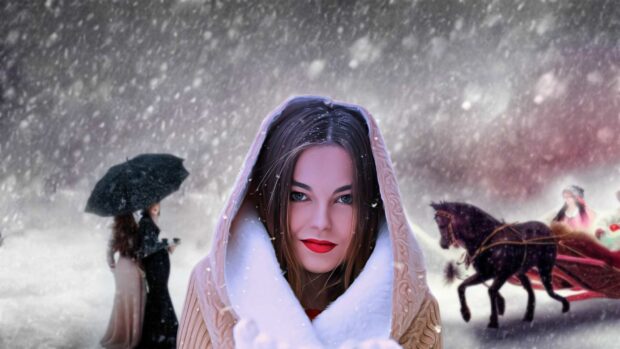
The original version of the song Jingle Bells consists of four verses and a chorus. But when Jingle Bells is performed today, most people skip the last three verses. And for good reason. James Lord Pierpont didn’t necessarily write the lyrics for Jingle Bells with children in mind.
We all know the first verse and the chorus of Jingle Bells. It’s innocent enough and about some jingle bells on a horse ringing while taking a sleigh ride in the snow.
Dashing thro’ the snow,
In a one-horse open sleigh,
O’er the hills we go,
Laughing all the way;
Bells on bob tail ring,
Making spirits bright,
Oh what sport to ride and sing
A sleighing song to night.
Jingle bells, Jingle bells,
Jingle all the way;
Oh! what joy it is to ride
In a one horse open sleigh.
Jingle bells, Jingle bells,
Jingle all the way;
Oh! what joy it is to ride
In a one horse open sleigh.
The lesser-known verses of the song contain several racy lines, especially by the conservative standards of the 1800s. These controversial lyrics also reveal the true intent of the song: Jingle Bells is really about young guys recklessly racing sleighs to impress and “go it while you’re young” with girls.
The second verse is about an “upsot” or overturned sleigh incident with a woman named Miss Fannie Bright.
A day or two ago,
I thought I’d take a ride,
And soon Miss Fannie Bright
Was seated by my side,
The horse was lean and lank;
Misfortune seemed his lot,
He got into a drifted bank,
And we, we got upsot.
The third verse is about laughing at someone laying on their back in the snow. Not a great example of Christmas Spirit or model behavior for a children’s Christmas song.
A day or two ago,
The story I must tell
I went out on the snow
And on my back I fell;
A gent was riding by
In a one-horse open sleigh,
He laughed as there I sprawling lie,
But quickly drove away.
The progression of the first three verses becomes clear by the fourth verse. In the first verse, the rider takes a carefree “laughing all the way” sleigh ride. The rider crashes in the second verse and embarrasses themselves with Miss Fannie Bright. By the third verse, the rider is flat on their back and being made fun of by other riders.
By the fourth and final verse, the rider has learned from their experiences. The last verse is about racing fast horses, impressing girls, and having sex while you are young.
Now the ground is white
Go it while you’re young,
Take the girls to night
And sing this sleighing song;
Just get a bob tailed bay
Two forty as his speed.
Hitch him to an open sleigh
And crack, you’ll take the lead.
This section, specifically, is a call for the young men racing their sleighs to “take the girls” while they are young.
Go it while you’re young
Take the girls tonight
The section that follows, is about racing fast horses.
Get a bobtailed bay
Two forty for his speed
And hitch him to an open sleigh
And you will take the lead
Bay is a term used to describe a redish-brown colored horse. Bobtail describes the style of cutting the hair on a horse’s tail short. Put them together and a “bobtailed bay” is a red-ish colored horse with a cropped tail.
The line, “Two forty for his speed” is a speed reference. It refers to the ability for a horse to trot a mile in two minutes and forty seconds, or 22.5 miles per hour. This is a good speed for any Standardbred horse that has been breed for pulling a sleigh or carriage.
Neither of these sections in the fourth verse aged well over the years. Having a bunch of school children sing “Go it while you’re young, Take the girls tonight” is grossly inappropriate. And the bobtailed bay horse references are antiquated in today’s automotive-focused society.
As a result, the reckless horse racing and sex references in verses 2-4 of Jingle Bells are usually removed by modern performers.
NERD NOTE: James Lord Pierpont was elected into the Songwriters Hall of Fame in 1970 in recognition of the universal success of his composition, “Jingle Bells”.
Bing Crosby And The Andrews Sisters Made Jingle Bells The Classic Christmas Song That It Is Today
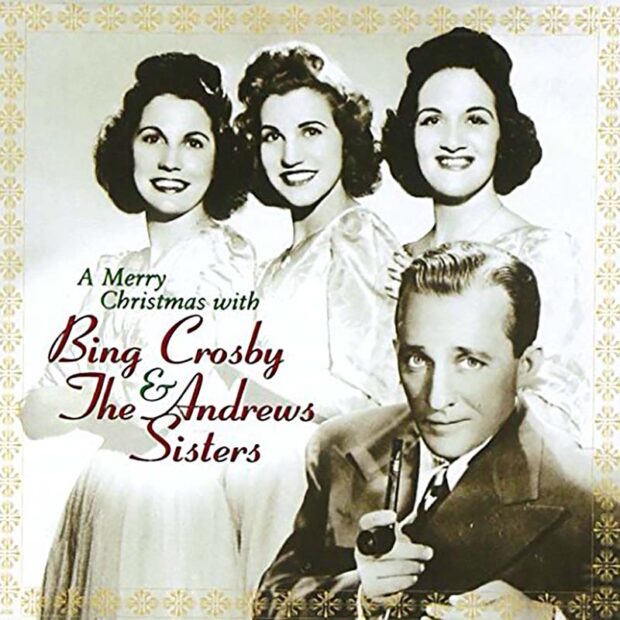
Although “Jingle Bells” was performed in holiday related performances as far back as the 1860s, it wasn’t until the 1940s that the song became a permanent part of the Christmas season. So, if James Lord Pierpont didn’t intend for Jingle Bells to be a Christmas song, then where did its Christmas connection come from?
In 1945, Bing Crosby and The Andrews Sisters recorded a version of “Jingle Bells” for his holiday album titled “Merry Christmas”. Their version of “Jingle Bells” was so popular that it reached #19 on the music charts and sold over a million copies.
Jingle Bells was never considered a Thanksgiving song ever again. From that point on, it was now a Christmas staple.
NERD NOTE: Bing Crosby performed in blackface many times during his career including in the films Dream House (1932), Mississippi (1935), Road to Singapore (1940), Holiday Inn (1942), Dixie (1943), and Here Come the Waves (1944).
Everything you need to know about James Lord Pierpont, The Racist Who Wrote Jingle Bells … #Christmas #JingleBells #ChristmasMusic #JamesLordPierpont #ChristmasCarols #racist Share on XBlackface Performers At Minstrel Shows Gave “Jingle Bells” Its First Burst Of Popularity
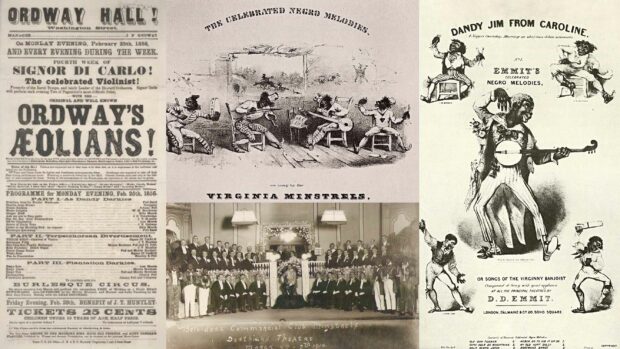
Bing Crosby doesn’t get all of the credit for making Jingle Bells popular. He shares that honor with a group of racist blackface performers.
In 1857, when Pierpont first published “Jingle Bells” under its original title “One Horse Open Sleigh”, he dedicated it to John Ordway, the organizer of a blackface performance troupe called “Ordway’s Aeolians“.
Not only would Ordway’s Aeolians performers dress up in blackface and sing Pierpont’s songs, they also performed racist skits. Over the years, Pierpont had developed a friendship with Ordway and provided his blackface Minstrel Show troupe with several songs, including “Jingle Bells”.
Although Pierpont likely performed “Jingle Bells” himself at churches and other venues, it was Ordway’s blackface troupe that helped bring “Jingle Bells” to the masses.
Despite Ordway’s support and profiting from Minstrel entertainment, he was firmly against slavery. A graduate of Harvard Medical College, Ordway was one of the first surgeons to volunteer for the Union at the start of the American Civil War. Ordway served in the 6th Massachusetts Militia and was one of the surgeons who tended to the wounded after the Battle of Gettysburg.
James Lord Pierpont: The (Racist) Who Wrote Jingle Bells … #Christmas #JingleBells #ChristmasMusic #JamesLordPierpont #ChristmasCarols Share on XJames Lord Pierpont Composed A Lot Of Racist Songs For Minstrel Entertainment Groups
From whaler to gold miner, Pierpont experimented with a variety of careers over his lifetime. But his most successful endeavor was writing racist songs for Minstrel Shows.
In the early 1800s, Minstrel Shows, featuring white people in blackface make-up, rose in popularity. These performances mocked and negatively depicted people from African descent and often included a mix of both skits and original racist music.
Here’s a list of some of the racist songs that Pierpont composed and what they were about:
- “The Colored Coquette” (1853): “The Colored Coquette” was written, composed, and arranged by Pierpont. It became a regular song for the famous minstrel artist Billy Morris at Boston’s Ordway Hall throughout the 1853–1854 season. “The Colored Coquette” was the first time that Pierpont wrote lyrics intended to be sung in a racist sounding “negro dialect.”
- “Kitty Crow” (1853): Pierpont wrote, composed, and dedicated this song to W. W. McKim, Esq.
- “Poor Elsie” (1854): This song was composed for the Campbell Minstrels.
- “Geraldine” (1854): Composed exclusively for George Kunkel’s Nightingale Opera Troupe.
- “Ring the Bell, Fanny” (1854): Credited as JAS. Pierpont Esq. (JAS is an abbreviated form of James), Pierpont wrote this song for George Kunkel’s Nightingale Opera Troupe. The song was exclusively sung by Harry Lehr.
- “The Little White Cottage; or, Nellie Moore” (1857): Co-wrote with with Marshall S. Pike of Pikes Minstrels
Although its demand started dwindling in the early 1900s, Minstrel entertainment didn’t fade from popularity until the civil rights movement gained acceptance in the 1960s and 1970s.
The popular holiday song Jingle Bells, was composed by James Lord Pierpont (1822–1893), a popular racist minstrel entertainment songwriter... #Christmas #JingleBells #ChristmasMusic #JamesLordPierpont #ChristmasCarols Share on XThe Man Who Wrote Jingle Bells, Also Wrote Several Confederate Anthems
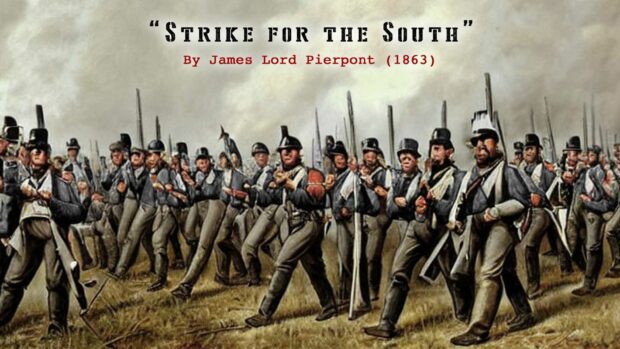
The decision to end slavery was a divisive issue in the United States that split communities and families in half, including the Pierpont family.
In 1859, James Lord Pierpont was still playing organ in his brother’s church in Savannah, Georgia, but that gig was about to end. Since his brother, Rev. John Pierpont, Jr. (1819–1879), openly spoke about the abolition of slavery, he was forced to close his church in Georgia and return home to Massachusetts.
Instead of using this situation as an opportunity to return North and reunite with his motherless children, James Lord Pierpont stayed behind in Savannah. He did not share his brother’s views on ending slavery. In fact, Pierpont was a staunch supporter of slavery and the Confederacy.
When the American Civil War broke out in 1861, Pierpont enlisted with the Confederate Army and joined the 1st Georgia Cavalry. His contributions to the Confederate States went well beyond his regular enlisted duties. Pierpont used his musical talent to write several Confederate anthems including “Our Battle Flag!”, “Strike for the South,” and “We Conquer, or Die!”
“Strike for the South“
By James Lord Pierpont (1863)
Strike for the South ! let her name ever be
The boast of the true and the brave;
Let Freedom’ d bright star still shine on her brow.
And her banner the proudest still wave.
Strike for the South ! shall the heroes who fell.
In graves all unhonored repose,
While the turf o’er each head, and the sword by each side.
Has been stained with the blood of her foes
Strike for the South! for Liberty’s sun.
In darkness and gloom has not set;
Her bright beams still shine like a light from above,
And will lead thee to victory yet.
Strike for the South ! for her weapons are bright.
And the heroes who wield them are strong;
Let her name brightly glow on the record of fame.
And hers be the proudest in song.
Strike for the South! we will honor her name.
For the glorious deeds she has done!
The laurel we’ll twine ‘around each patriot brow.
And shout when the battle is won.
Strike for the South! it must, never be said
That her banner was furled to a foe;
Let those stars ever shine in bright glory alone.
And the pathway to victory show.
“We Conquer, or Die!”
By James Lord Pierpont (1861)
The war drum is beating, prepare for the fight,
The stern bigot Northman exults in his might.
Gird on your bright weapons your foemen are nigh,
|: And this be our watchword, “We conquer or die!” 😐
The trumpet is sounding from mountain to shore,
Your swords and your lances must slumber no more,
Fling forth to the sunlight your banner on high,
|: Inscribed with the watchword: “We conquer or die!” 😐
March on to the battlefield, there to do or dare,
With shoulder to shoulder all danger to share,
And let your proud watchword ring up to the sky,
|: Till the blue arch re-echoes, “We conquer or die!” 😐
Press forward undaunted, nor think of retreat,
The enemy’s host on the the threshold to meet,
Strike firm, till the foeman before you shall fly,
|: Appalled by the watchword, “We conquer or die!” 😐
Go forth in the pathway our forefathers trod,
We too fight for Freedom, our Captain is God,
Their blood in our veins, with their honors we vie,
|: Their’s too, was the watchword, “We conquer or die!” 😐
We strike for the South – Mountain, Valley, and Plain,
For the South we will conquer, again and again;
Her day of salvation and triumph is nigh,
|: Our’s then be the watchword, “We conquer or die!” 😐
The United States Civil War Divides The Pierpont Family
James Lord Pierpont’s support of slavery and the Confederacy didn’t just drive a divide between him and his brother, but his father as well. Pierpont’s father, Reverend John Pierpont (1785–1866), was an influential and powerful voice in the movement to end slavery. In addition to speaking our against slavery in his church sermons, Reverend Pierpont published anti-slavery poems and even served as the chaplain in the Union’s 22nd Massachusetts Infantry.
With James Lord Pierpont in the Confederacy’s 1st Georgia Cavalry and Reverend John Pierpont in the Union’s 22nd Massachusetts Infantry, this put father and son on opposite sides in the American Civil War.
James Lord Pierpont’s support of the Confederacy during the American Civil War (The American Civil War (April 12, 1861 – May 26, 1865) drove a permanent divide between himself and the rest of his family. After the Confederacy’s defeat, Pierpont never returned home to his children and the rest of his family in Massachusetts. He relocated to Florida where he lived out his final years before his death in 1893.
NERD NOTE: James Lord Pierpont, the songwriter who wrote the song Jingle Bells is the uncle of J.P. Morgan. Pierpont’s older sister, Juliet, married the millionaire Junius Spencer Morgan. The Morgan’s decided to use Juliet’s maiden name, Pierpont, as the middle name for their oldest child, John Pierpont Morgan. As an adult, John followed in his father’s footsteps into banking and became one of most well-known names in the financial industry.
The History Of Jingle Bells: Did you know that J.P. Morgan's uncle wrote the famous Christmas song Jingle Bells? … #Christmas #JingleBells #ChristmasMusic #JamesLordPierpont #ChristmasCarols Share on XThe Disturbing Jingle Bells Racist Origin Story
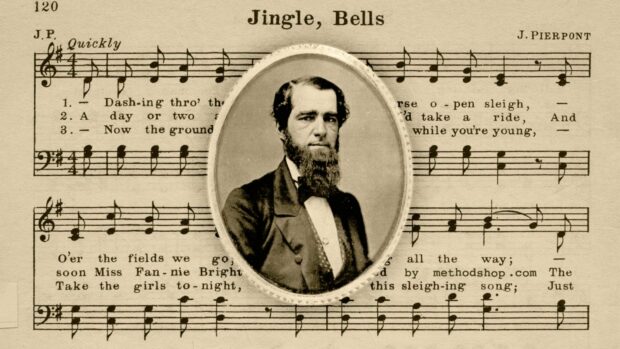
There’s no question that James Lord Pierpont was an accomplished song writer. And not all of the songs that Pierpont wrote were racist in nature. Both his songs, “The Returned Californian,” about his failed quest for fortune during the California Gold Rush, and “Jingle Bells” lacked mentions of race.
However, it was extremely sad for me personally to discover that Pierpont was such a terrible person. Not only was he an outspoken racist who plagiarized Jingle Bells from other sleigh riding songs, but he abandoned his wife and children multiple times.
Jingle Bells truly is a popular Christmas carol, with a very curious history.
The Strange Origins Of Jingle Bells: The Shocking True Story Behind Your Favorite Christmas Carol … #Christmas #JingleBells #ChristmasMusic #JamesLordPierpont #ChristmasCarols Share on X
Frank Wilson is a retired teacher with over 30 years of combined experience in the education, small business technology, and real estate business. He now blogs as a hobby and spends most days tinkering with old computers. Wilson is passionate about tech, enjoys fishing, and loves drinking beer.


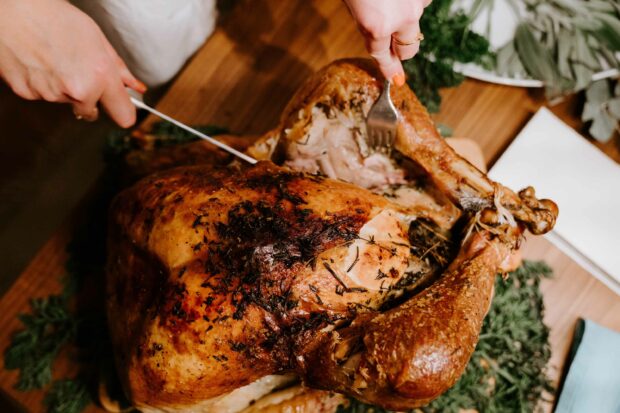

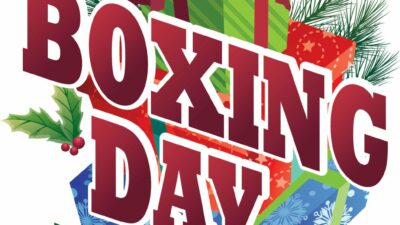
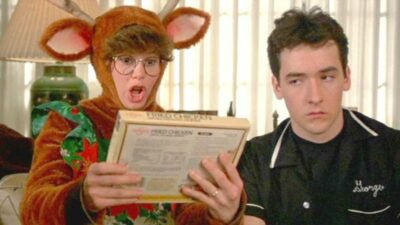
 11 Good Christmas Movies That You Forgot Were Christmas Movies
11 Good Christmas Movies That You Forgot Were Christmas Movies
Leave a Reply
You must be logged in to post a comment.